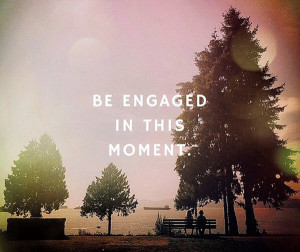Originally posted September 15, 2017
[dropshadowbox align=”none” effect=”horizontal-curve-bottom” width=”100%” height=”” background_color=”#f3e4e4″ border_width=”1″ border_color=”#dddddd” inside_shadow=”false” ]Be grateful for whoever comes, because each has been sent as a guide from beyond.— Rumi, from “The Guest House”[/dropshadowbox]
Imagine if we were to fully believe this and felt grateful for and loved whoever we’re with at any given moment in time.
Now imagine seeing that person as highly sentient like ourselves, each with his or her own story, knowing that we are interacting with each other now for reasons that may not be obvious in this moment. And then realize that there are undoubtedly layers of additional opportunity in this moment — allowing our interest to swell by being in the moment with this interaction, at this time, fully engaged, fully open and also being a studious observer.
How can we become more engaged in the moment?
This is much more difficult if our day is packed and we are just trying to manage a sense of constant chaos and distraction.
If our days are filled with scheduled meetings and phone calls, we might be just getting on with a conversation or meeting so we can move on to something we more look forward to doing. We’re checking off our to-do list, which affects the quality of each of our interactions.
A better strategy is to engage in each interaction with our full attention. It helps to schedule time in our calendar for meetings with ourselves, to use as we like best in the moment. It might be to launch into a high-opportunity project that has been waiting. It might be to take a break and a mental vacation, where we may find creative ideas popping of their own volition. It might be to sort out the latest incoming chaos and to calendar it for handling at a future date.
The strategy of pre-planning our days to include these meetings with ourselves at reasonable intervals, and pre-dream the other meetings, calls and other activities (which we can do in the shower or even in bed in the morning or the night before) allows us to arrange things so we can focus 100% on one thing at a time, in the moment — the Now.
As interruptions arise or even fresh thoughts relevant to the conversation or the meeting we are in, it may help to note them on paper or on your tablet so you don’t lose them; this helps to relieve our mind of worrying that we’ll forget them. I create a place for these notes until I can sort them into the appropriate file, which allows me to be more in the moment and not overwhelmed.
If we allow ourselves to remember how much can be accomplished in a few minutes when we are patiently engaged, we can really listen and be more absorbed in the moment — feeling the feelings inherent in the conversation and being grateful for this present opportunity whether we understand its greater meaning right now or not.
Our attention is divided into the Now, the past and the future. All we really have at our grasp is this moment, the Now. The past and future are concepts, abstractions, ways our mind has of organizing experience so it seems to make sense.
[dropshadowbox align=”none” effect=”horizontal-curve-bottom” width=”100%” height=”” background_color=”#f3e4e4″ border_width=”1″ border_color=”#dddddd” inside_shadow=”false” ]What is always real is the Now, this moment. [/dropshadowbox]
Best to all,
Bill
Follow my regular media blog contribution, In Terms of ROI at Media Village, Myers new site. Here is the link to my latest post, Identifying the Ethical Limits of Persuasion in Advertising.

